-
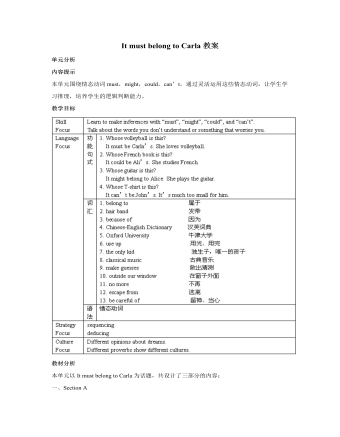
人教版新目标初中英语九年级上册It must belong to Carla教案
一、Section A该部分有4个模块。第一模块围绕Whose volleyball is this? 这一话题展开思维( 1a)、听力(1b)、口语( 1c)训练;第二模块围绕上一模块中的话题进行听力( 2a-2b)、口语训练( 2c);第三模块继续围绕前两个模块中的“making inferences”展开训练。训练形式为阅读排序( 3a)和两人问答(3b);第四模块仍就上一话题展开讨论。二、Section B该部分有4个模块。第一模块要求根据图画和所提供的单词写出合理的句子;第二模块在听力( 2a-2b)和分角色口语训练( 2c)的基础上,继续进行“推测”训练; 第三模块围绕“Strange events in Bell Tower neighborhood”这一话题展开阅读( 3a)和写作(3b -3c)训练;第四模块以dream为话题展开小组活动。三、Self Check该部分有3个模块。第一模块以填空形式对所学词汇进行训练;第二模块就8个谚语展开阅读和讨论。

人教版新目标初中英语九年级上册Where would you like to visit教案2篇
The First PeriodⅠ.Teaching Aims and DemandsKnowledge Objects(1) Key Vocabularytiring, educational, fascinating, thrilling, peaceful, exotic, trek, jungle, take it easy, explore, historic, site(2) Target LanguageWhere would you like to go on vacation?I’d like to trek through the jungle, because I like exciting vacations.2. Ability Objects(1)Train students to talk about places they would like to visit with the target language.(2)Train students to describe vacations with different adjectives.(3)Train students' listening skill.3. Moral Object,It′s more interesting to go on vacating somewhere instead of staying at home.Ⅱ. Teaching Key Points1. Key Vocabularytiring, educational, fascinating, thrilling, peaceful, exotic, trek, jungle, take it easy, explore, historic, site2. Target LanguageTalk about different places with the target language.Ⅲ. Teaching Difficult Points1. Describe vacations with different adjectives.2. Talk about different places with the target language.Ⅳ. Teaching Methods1. Teaching by illumination2. Teaching by doing chain drills3. Teaching by pairworkⅤ. Teaching Aids1. A tape recorder2. Some pictures of different places with famous views

人教版新目标初中英语九年级下册Rainy days make me sad教案
1. 教材分析本单元以how do things affect you?为话题, 从颜色、天气、音乐、广告、产品等方面谈论了外界事物如何影响人的心情。要求学生掌握表达某物或某事给人带来的感觉、看法或影响等。共设计了四个部分的内容:Section A 该部分有4个模块:第一模块围绕Which restaurant would you like to go to?这一话题展开思维(1a)、听力(1b)、口语(1c)训练;第二模块围绕How does music affect you? 进行听力(2a-2b)、口语训练(2c);第三模块继续围绕how do colors in the restaurant affect you这一话题展开训练,训练形式为阅读和问题体验(3a)和小组活动(3b);第四模块仍就How do things affect you这一话题以调查的形式展开讨论。Section B该部分有4个模块:第一模块围绕产品广告对人们的影响这一话题以“配对”(1a)与“列举”(1b)两种形式展开训练;第二模块继续围绕How do things affect you? 进行听力(2a-2b)、口语对话训练(2c);第三模块围绕“Advertising”这一话题展开阅读(3a-3b)和写作(3c)训练;第四模块围绕How posters affect you这一话题以口语训练形式展开小组活动。

人教版新目标初中英语九年级下册Could you please tell me where the restrooms are教案
Step Ⅰ RevisionCheck homework. Ask a few students to read the article in 3a.Then ask a few students to read their guides.Step Ⅱ Part 1Look at the words in the box. Ask a student to read them. Make sure the students understand the meaning of the words. You are to fill in the blanks with the words. In some cases, students may need to use another form of the word, for example adjusting for tense or subject/ verb agreement.Ask students to fill in the blanks on their own.Check the answers. Step ⅢPart 2Go through the instructions with the class.Look at the example with the students.Ask students what the answer would be.Ask a student to read the question and answer it.Excuse me, could you tell me where the bank is, please?The bank is across the street from the shopping malt.Get students to complete the work in pairs.Check the answers. Ask a few students to read their questions.Step Ⅳ Just for Fun!Ask all the students to read the conversation. Ask: What is funny about this cartoon? Help students to explain. A Martian is a person from the planet Mars.There is no such thing as Martian food on Earth, and the clerk looks silly because he is trying to think of where there is a Martian restaurant.Invite some pairs of students to present this conversation to the rest of the class.Step Ⅴ Summary and HomeworkIn this class, we’ve done much writing practice using the key vocabulary words and the target language presented in this unit. After class, please finish the questions in 2 in your exercise books. Then finish the exercises on pages 47~48 of the workbook as well.The Seventh Period Ⅰ Teaching Aims and Demands1. Knowledge Objects(1) Key Vocabularyimage, adventure, jealousy, hero, crime, journey, brave, no longer, show interest in, take it easy, become interested in, plain looks(2)Text:Grown-ups like cartoons, too.2. Ability Objects(1) Fast-reading to get a general idea of the text.(2) Careful-reading to get the detailed information in the text.

人教版新目标初中英语九年级下册We’re trying to save the manatees教案2篇
本单元主要围绕着有关濒临灭绝的动物这一话题,学习了应该怎样保护我们的环境,以及就某一问题展开辩论。目标提示语言目标能够运用所学知识,就某一问题展开辩论。认知目标1、复习一些语法:现在进行时、一般现在时、用used to 表示一般过去时、现在完成时、一般过去时的被动语态。2、学会表达同意和不同意。3、学会以下基本句型:We’re trying to save the manatees.Manatees eat about 100 pounds of food a day.There used to be a lot of manatees.In 1972,it was discovered that they were endangered.Some of the swamps have become polluted.情感目标了解一些濒临灭绝的动物的生活习性和濒临灭绝的原因,教育学生应该如何保护环境。教学提示充分利用多媒体等教学设备,创设与本课话题相关的情境,如各种不同种类的动物、动物园以及有关环境的画画等等。围绕着本单元的教学目标,设计一些贴近学生实际的教学任务,如让学生谈论自己最喜欢的动物,如何拯救濒危动物,如何保护环境等等。让学生根据所学知识,就动物园是否对动物有利以及其他的话题进行辩论。

人教版新目标初中英语八年级上册How do you get to school教案2篇
Step Ⅶ Role play ( Work on 1b)1. First ask two students to read the dialogue to the class.Sa: How do you get to school?Sb: Well, I ride my bike to the subway station. Then I take the subway.2. Now work with a partner.Suppose you use two kinds of transportation to get to school \Hangzhou\Beijing... (bus, train, subway, walking, bike, etc.) Tell how you get there. You may use the phrases in 1a.3. Then ask different pairs of students to present their conversations to the class.Step ⅧListening1. Work on 2a(1) First ask students to read the list of information that Thomas wants to know.…where Nina lives.…how far from school she lives.…how long it takes to get to school.…how she gets to school.…what she thinks of the transportation.(2) Tell students what transportation and bus stop mean.bus stop 汽车站 transportation n. 运送;运输Then tell students we'll hear a recording. Please put a checkmark in front of each thing that Thomas wants to know.(3) Now play the recording for students.( Have students pay attention to the sample answer.) (4) Then correct the answers.
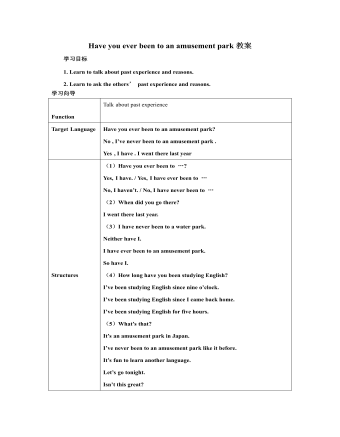
人教版新目标初中英语八年级下册Have you ever been to an amusement park教案
(1)Have you ever been to …? Yes, I have. / Yes, I have ever been to …No, I haven’t. / No, I have never been to …(2)When did you go there? I went there last year. (3)I have never been to a water park. Neither have I. I have ever been to an amusement park. So have I. (4)How long have you been studying English? I’ve been studying English since nine o’clock. I’ve been studying English since I came back home. I’ve been studying English for five hours. (5)What’s that? It’s an amusement park in Japan. I’ve never been to an amusement park like it before. It’s fun to learn another language. Let’s go tonight. Isn’t this great?space museum, amusement park, water park, South America, Peru, Holland, European culture, tour guide, flight attendant, musical instrument, more than, be from, get to, take lessons, neither, discover, graduate, change
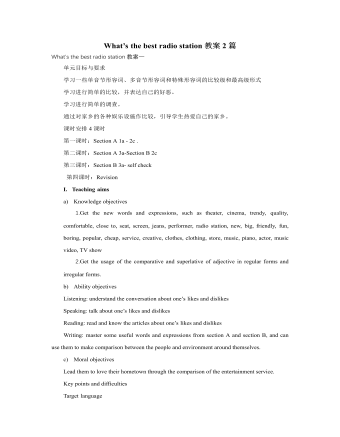
人教版新目标初中英语八年级上册What’s the best radio station教案2篇
教学重点和难点:运用所掌握的语言描述,比较不同地点的特点。在练习中学习掌握英语比较级和最高级的用法。课前准备分配小组,每组五至六人。通过上网或翻阅报刊杂志等方法,确定旅游线路,做出基本的旅游计划。教学设计:本节课流程图 学法指导:1.由于这是一堂新课,在教学中应注意面向全体,发挥学生的主体性,引导学生积极参与,激发学生的求知欲和学习积极性,指导学生积极思维,主动获取知识,养成良好的学习方法。逐步学会独立解决问题。总之要尽可能调动学生的非智力因素促进智力因素的发展。教法选择:1.电化教学法2.课堂讨论法3.任务型教学法采用这些方法的目的是为了充分调动学生的学习积极性,使学生变被动学习为主动学习。通过电脑形象的演示,加强印象,提高兴趣,突破难点,提高教学效率,进而增大教学的容量和信息量。充分体现教师为主导,学生为主体的教学原则。
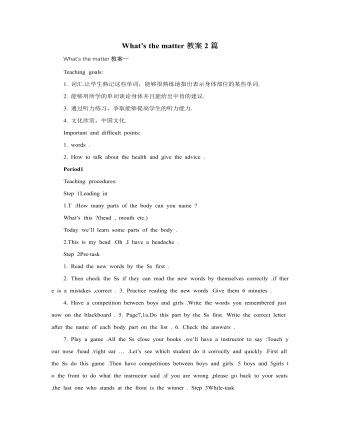
人教版新目标初中英语八年级上册What’s the matter教案2篇
She shouldn’t go to the party tonight.Step7. TaskT: You know, there are lots of problems in our life. If you are a doctor, please tell us how to solve the problem. I will divide you into 9 groups. Please work in groups. And then choose one of you to report your ideas.The following are the problems:I have a toothache.I am hungry. I have a sore throat.I am stressed out. I have a sore back.I am tired. I can’t sleep.I have a cold. I have a headache.Report: If you have a headache, you should go to bed early. You should see the doctor. You should eat some medicine. You shouldn’t wash your face with cold water.You shouldn’t sleep late.You shouldn’t swim.…..T encourages the students to give advice as much as possible.Homework:1. Chose one of the problems, and write down your advice2. Copy the new words这一步是用于热身的,同时也可以让他们复习一部分的表示人体部位的单词,扩充知识.学习语言的过程也是一个不断积累的过程,复习旧知识,增添新知识.通过小游戏,强化学生对Does she/he have…这个句子的运用能力.通过复习,自然的引到下面新知识的学习。充分利用表格,由句子到对话,再到文章,让学生循序渐进. 提高学生的综合语言运用能力,运用以前学过的知识来解决身边的问题.Period 5 (Section B 3a—3c, selfcheck)教学内容与分析:

人教版新目标初中英语八年级下册He said I was hard-working教案2篇
This activity introduces some new vocabulary and provide oral practice using the target language.Task 1 . Ask four students to stand in front of the class, and the teacher asks them the following questions as a reporter.1.What are you going to do when you grow up?2.What are you going to do next week?3.What are going to do after school?The students will give different answers, then ask a good student to report what they said.I am going to e a doctor.What did she say?----------She said she was going to be a doctor.I am going to have a party on Friday night.What did he say?-------He said he was going to have a party on Friday night.I am going to do my homework.What did she say ?------ She said she was going to do her homework.I am going home after school.What did she say?-----She said she was going home after school.Say In this unit we are going to learn to use words like to report what someone said.Task 2. Read the instructions. Then ask a student to read the four questions. And write the words on the Bb. Explain what soap opera is.Task 3. Ask the students to Look at the pictures, point out the TV screens in the picture. Ask one girl to read what Marcia said.What did Marcia say? She said She said she was having a surprise party for Lana on Friday night. Repeat the other pictures in the same way.Activity3. Listen and number the pictures in activity 1a.

人教版新目标初中英语九年级上册Teenagers should be allowed to choose their own clothes教案2篇
Step 1 Greeting Greet the class and check the homeworkStep 2 A duty report The S on duty gives a report on the rules in his home and lead in 3a “Sun Fei’s and Wu Yu’s rules” Step 3 ReadingSs read the conversation and write the two girls’ rules in the chart. Check the answers.Get Ss to read after the tape and then read aloud by themselves. Then, T explains the language points.Step 4 Pairwork 3bRole play. Use the information in chart to practice with the conversation in 3a covered. They can look at the sample conversation in the right box.Step 5 Task 2 “Who’s the best reporter?”Make a survey by asking any 5 students the questions in the chart in activity 4. Then give out a report about it. See who is the best reporter? And the best reporter will get a nice ball-pen.Step 6 Summary and homework:Write out the report in your exercise-books.Period ThreeStep 1 Greeting and a duty reportThe S gives a duty report talking about his experience of being late for school. Lead in the question “Do you ever get to school late? How often do you get to school late? Always, usually, sometimes, or never?Step 2 1a Get Ss to finish writing.Step 3 Pairwork 1b Get Ss to talk about their answers with their partners using the sample conversation in the box on the right.Step 4 Listening practice2a Lead-in: What will happen if you get to school late? What about Peter? Let’s listen to a conversation between Peter and his father. Get Ss to finish 2a (As usual, for the first time, Ss only listen.) Check the answers.
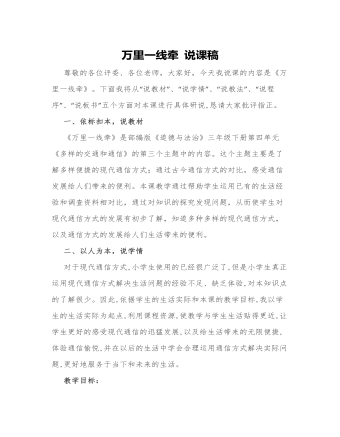
万里一线牵 说课稿
尊敬的各位评委、各位老师,大家好,今天我说课的内容是《万里一线牵》。下面我将从“说教材”、“说学情”、“说教法”、“说程序”、“说板书”五个方面对本课进行具体研说,恳请大家批评指正。一、依标扣本,说教材《万里一线牵》是部编版《道德与法治》三年级下册第四单元《多样的交通和通信》的第三个主题中的内容。这个主题主要是了解多样便捷的现代通信方式;通过古今通信方式的对比,感受通信发展给人们带来的便利。本课教学通过帮助学生运用已有的生活经验和调查资料相对比,通过对知识的探究发现问题,从而使学生对现代通信方式的发展有初步了解,知道多种多样的现代通信方式,以及通信方式的发展给人们生活带来的便利。 二、以人为本,说学情对于现代通信方式,小学生使用的已经很广泛了,但是小学生真正运用现代通信方式解决生活问题的经验不足、缺乏体验,对本知识点的了解很少。因此,依据学生的生活实际和本课的教学目标,我以学生的生活实际为起点,利用课程资源,使教学与学生生活贴得更近,让学生更好的感受现代通信的迅猛发展,以及给生活带来的无限便捷,体验通信愉悦,并在以后的生活中学会合理运用通信方式解决实际问题,更好地服务于当下和未来的生活。
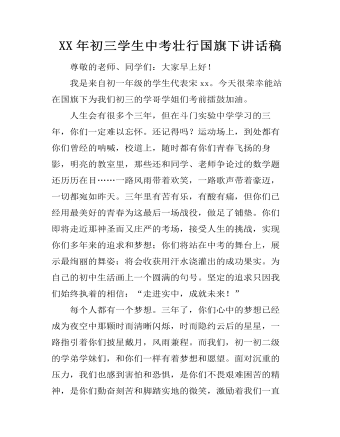
XX年初三学生中考壮行国旗下讲话稿
尊敬的老师、同学们:大家早上好!我是来自初一年级的学生代表宋xx。今天很荣幸能站在国旗下为我们初三的学哥学姐们考前擂鼓加油。人生会有很多个三年,但在斗门实验中学学习的三年,你们一定难以忘怀。还记得吗?运动场上,到处都有你们曾经的呐喊,校道上,随时都有你们青春飞扬的身影,明亮的教室里,那些还和同学、老师争论过的数学题还历历在目……一路风雨带着欢笑,一路歌声带着豪迈,一切都宛如昨天。三年里有苦有乐,有酸有痛,但你们已经用最美好的青春为这最后一场战役,做足了铺垫。你们即将走近那神圣而又庄严的考场,接受人生的挑战,实现你们多年来的追求和梦想;你们将站在中考的舞台上,展示最绚丽的舞姿;将会收获用汗水浇灌出的成功果实。为自己的初中生活画上一个圆满的句号。坚定的追求只因我们始终执着的相信:“走进实中,成就未来!”
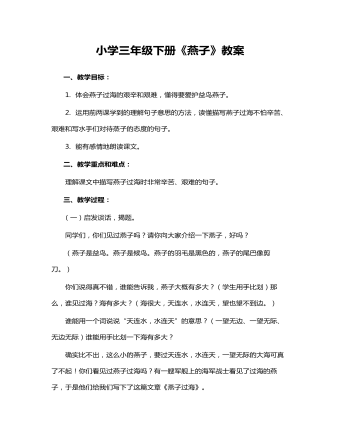
小学三年级下册《燕子》教案
一、教学目标:1. 体会燕子过海的艰辛和艰难,懂得要爱护益鸟燕子。2. 运用前两课学到的理解句子意思的方法,读懂描写燕子过海不怕辛苦、艰难和写水手们对待蒸子的态度的句子。3. 能有感情地朗读课文。二、教学重点和难点:理解课文中描写燕子过海时非常辛苦、艰难的句子。三、教学过程:(一)启发谈话,揭题。同学们,你们见过燕子吗?请你向大家介绍一下燕子,好吗?(燕子是益鸟。燕子是候鸟。燕子的羽毛是黑色的,燕子的尾巴像剪刀。)你们说得真不错,谁能告诉我,燕子大概有多大?(学生用手比划)那么,谁见过海?海有多大?(海很大,天连水,水连天,望也望不到边。)谁能用一个词说说“天连水,水连天”的意思?(一望无边、一望无际、无边无际)谁能用手比划一下海有多大?确实比不出,这么小的燕子,要过天连水,水连天,一望无际的大海可真了不起!你们看见过燕子过海吗?有一艘军舰上的海军战士看见了过海的燕子,于是他们给我们写下了这篇文章《燕子过海》。教师范读(二)学生质疑。读了这篇课文你有什么问题呢?(燕子为什么要过海?为什么它要不分昼夜地飞?为什么像雨点一样落下来?)
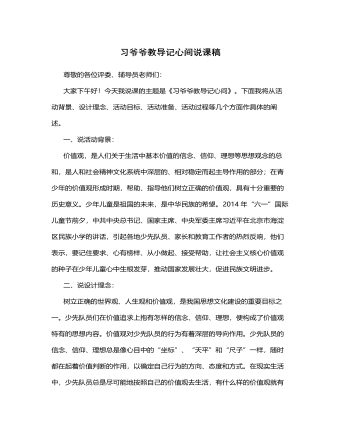
习爷爷教导记心间说课稿
〖设计意图:使少先队员更深刻更正确地领悟价值观的重要作用,初步树立了正确的价值观,下决心在价值观的引导下调整好自身的精神面貌与行为取向。〗第四版块:快乐宣誓——品味价值通过以上环节的活动,少先队员已经深深意识到:树立正确价值观的重要性。在此基础上的第四环节以深化主题,提高少先队员思想认识为目的。全体少先队员共同宣誓将本次活动推向高潮。以上四个环节由浅入深,层层递进,充分调动了少先队员的多种感官参与活动,促进了少先队员身心和能力的发展,顺理成章的达到了本次活动的目的。最后中队辅导员做总结,结束本次队会。“同学们, 这次主题队会开得很有意义,也很成功。通过对习爷爷讲话和社会主义核心价值观的学习,你们对社会主义核心价值观有了进一步的了解。希望你们今后能主动加强自我修养,不断提高自身素质,树立社会主义核心价值观,争做文明守纪好少先队员,自觉成为社会主义事业的建设者和接班人。”
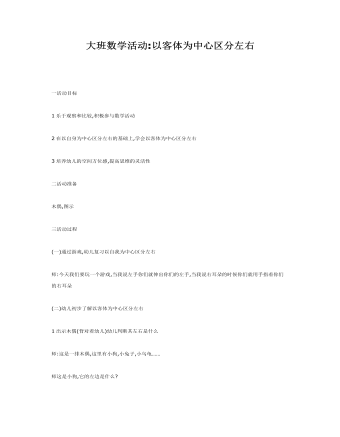
大班数学活动以客体为中心区分左右课件教案
2在以自身为中心区分左右的基础上,学会以客体为中心区分左右3培养幼儿的空间方位感,提高思维的灵活性二活动准备木偶,图示三活动过程(一)通过游戏,幼儿复习以自我为中心区分左右师:今天我们要玩一个游戏,当我说左手你们就伸出你们的左手,当我说右耳朵的时候你们就用手指着你们的右耳朵
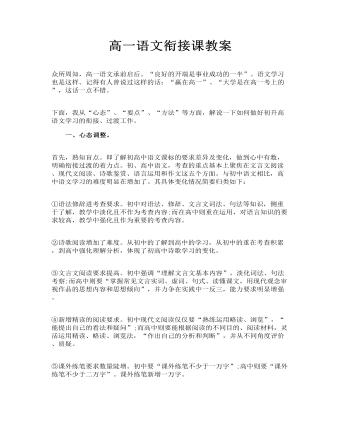
高一语文衔接课教案
一、心态调整。 首先,熟知盲点。即了解初高中语文课标的要求差异及变化,做到心中有数,明确衔接过渡的着力点。初、高中语文,考查的重点基本上聚焦在文言文阅读、现代文阅读、诗歌鉴赏、语言运用和作文这五个方面。与初中语文相比,高中语文学习的难度明显在增加了。其具体变化情况简要归类如下: ①语法修辞进考查要求。初中对语法、修辞、文言文词法、句法等知识,侧重于了解,教学中淡化且不作为考查内容;而在高中则重在运用,对语言知识的要求较高,教学中强化且作为重要的考查内容。 ②诗歌阅读增加了难度。从初中的了解到高中的学习,从初中的重在考查积累,到高中强化理解分析,体现了初高中诗歌学习的变化。
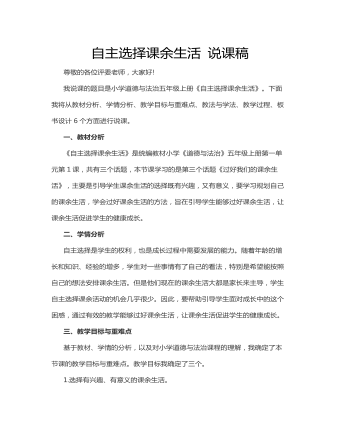
自主选择课余生活 说课稿
我说课的题目是小学道德与法治五年级上册《自主选择课余生活》。下面我将从教材分析、学情分析、教学目标与重难点、教法与学法、教学过程、板书设计6个方面进行说课。一、教材分析《自主选择课余生活》是统编教材小学《道德与法治》五年级上册第一单元第1课,共有三个话题,本节课学习的是第三个话题《过好我们的课余生活》,主要是引导学生课余生活的选择既有兴趣,又有意义,要学习规划自己的课余生活,学会过好课余生活的方法,旨在引导学生能够过好课余生活,让课余生活促进学生的健康成长。二、学情分析自主选择是学生的权利,也是成长过程中需要发展的能力。随着年龄的增长和知识、经验的增多,学生对一些事情有了自己的看法,特别是希望能按照自己的想法安排课余生活。但是他们现在的课余生活大都是家长来主导,学生自主选择课余活动的机会几乎很少。因此,要帮助引导学生面对成长中的这个困惑,通过有效的教学能够过好课余生活,让课余生活促进学生的健康成长。三、教学目标与重难点基于教材、学情的分析,以及对小学道德与法治课程的理解,我确定了本节课的教学目标与重难点。教学目标我确定了三个。
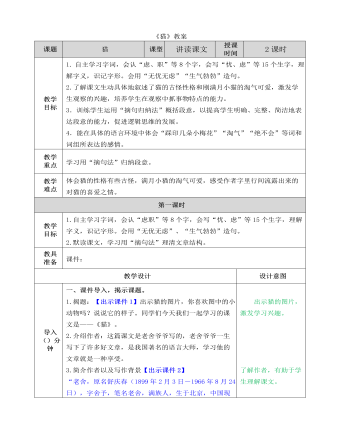
部编人教版四年级下册《猫》教案
三、总结全文,完成课后练习1.老舍笔下的猫你喜爱吗?为什么?老舍笔下的猫不像猫,倒像——(小孩子)。老舍把猫当作小孩子来写,用拟人化的手法写出了它的淘气、可爱,表达了对猫的喜爱之情。2.让我们有感情地朗读课文,把你的喜爱之情也表达出来。3.师述:你能学习课文的写法,围绕总起句写一段具体的话吗?【出示课件25】出示总起句(任选一题):(1)猫真老实。(2)猫很尽职。(3)课间活动丰富多彩。(4)这堂自习课真静啊!4.阅读链接【出示课件26】读读课后的阅读链接,体会不同作家对猫的喜爱之情。同样写猫,有什么不同?预设:夏丐尊写对猫的喜爱,用了衬托的方法,从妻子孩子对猫的喜爱,表达自身的喜爱之情。
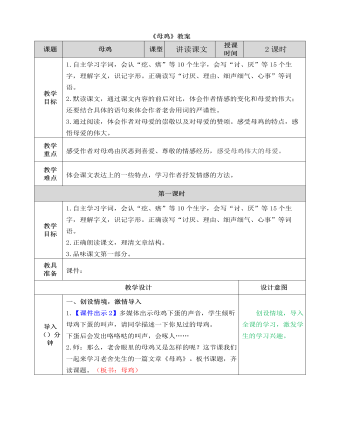
部编人教版四年级下册《母鸡》教案
一、复习检查,导入新课【出示课件12】1.检查字词出示生字卡片:疙瘩侮辱聋子啄一啄伏地凄惨忠厚毒手歪头掘地讨厌理由细声细气心事田坝反抗可恶成绩心思警戒预备汤圆啼叫疙瘩汤圆2.谈话导入新课:上节课我们学习了课文的第一部分,认识了无病呻吟、欺软怕硬、爱炫耀的母鸡,这节课,我们将继续跟随老舍先生了解一下第二部分,又介绍了母鸡的什么特点?二、自主探究,深入学文1.什么原因使作者改变了看法?在文中找到能概括说明这一原因的句子,画下来。三、根据学生的回答出示:【出示课件13】它负责、慈爱、勇敢、辛苦,因为它有了一群鸡雏。它伟大,因为它是鸡母亲。一个母亲必定就是一位英雄。


